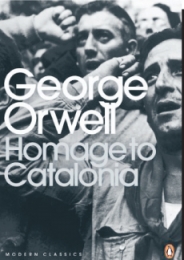Book Review by Sergio Angulo Bujanda
 A 15-year-old soldier with his face covered with blood, not by a fascist shot but by a burst bullet from his own faulty rifle, is the most representative image in Homage to Catalonia, in which George Orwell tells us about his first-hand experience fighting for the Spanish Republic against Franco’s troops in the Spanish Civil War.
A 15-year-old soldier with his face covered with blood, not by a fascist shot but by a burst bullet from his own faulty rifle, is the most representative image in Homage to Catalonia, in which George Orwell tells us about his first-hand experience fighting for the Spanish Republic against Franco’s troops in the Spanish Civil War.
This book is known for portraying the harsh routine of the life at the front – and it is certainly good on that – but it is most of all about the internal conflicts of the Spanish Republican left-wing factions.
Orwell joined the POUM (a Trotskyite Spanish political party) on arrival in Barcelona in December 1936, where the story begins. He is amused by the fact that the anarchists and trade unions are in power and there is a real revolution as the city is truly run by the working class.
With a clear and crisp prose style, Orwell describes how the rich and the upper class are nowhere to be seen in Barcelona. There are no ranks in the republican army. In the barber shops, there are signs saying barbers are not servants anymore, waiters don’t accept tips in restaurants and cafés, nobody is called “Don” or “Señor” and all the business and factories have been collectivised by the trade unions.
Often using humour, Orwell – an educated and travelled English man who had several years’ service in the British Army – writes about how he interacts with the illiterate and non-experienced Spanish militiamen, and also how he integrates, to varying degrees of fortune, with local Spanish cultural practices.
As the book continues, Orwell is sent to the front with his POUM comrades, where he realises that the main troubles are where to find firewood for heat, the lack of cigarettes, the scarcity of candles, and the enemy’s bullets – in that order.
However, even with the futility of his time in the trenches, Orwell remarks on the passionate faith the Spanish militiamen have in a social revolution that brought them a sense of freedom and equality never even dreamed of previously.
Eventually Orwell is wounded by a stray bullet and sent to the rear guard. Back in Barcelona, he realises how the conflict is far more complex than he originally thought, and that the political complexities of the fight have little to do with combat at the front.
Everything has changed; the rich and the upper-class are back in business and the different left-wing factions that form the republican army find themselves at odds with one another, to the extent that the POUM is declared illegal and its members are persecuted by the Stalinists that are now in power. It is at this point of the book that I’d strongly recommend consulting the appendices so as not to get lost in the alphabet soup of Spanish political parties and factions he recites.
Orwell goes on to explain how the young and idealistic Spanish Republic was defeated not only by the fascist troops of Franco, but also by its own internal ambitious factions fighting for the control of the republic. Like that 15-year-old soldier injured by his own faulty rifle, a battered Spanish Republic falls through acts inflicted on itself.
Homage to Catalonia is really an homage to the militiamen and the working class that created a classless society and fought against fascism and, at the same time, criticised any kind of totalitarianism.
Orwell is probably better known for his masterworks 1984 or Animal Farm, but neither could have been conceived without his field experience in the Spanish Civil War, and it is indeed this experience that differentiates Orwell from most of the war correspondents at the time, both Spanish and foreign, who merely reported the official propaganda coming from either side.
It is not a complete history of the war, far from it, but it is very thoughtful and honest, even as Orwell warns us of his biases. It is so honest that, in Spain, it has become uncomfortable reading for those on all parts of the political spectrum.
A quick read that is hard to put down, Homage to Catalonia is strongly recommended for these who seek for an alternative approach to the black-and-white views of the Spanish Civil War.











